January '25 Monthly Review
Oh wow, it's that time of the month again. January has gone quickly, and thank Jebus for that. It's nice that it's not dark all the time now; that extra hour in the morning and evening makes a difference.
Office
We are nearing five years since the COVID-19 pandemic lockdowns. The world has changed a lot since then. I cannot conceive of going to an office five days a week. Back in the day, I'd be awake at Six, out of the house at Seven to be in the office at Eight. I'd leave at Five and be back home at Six. Bonkers!
At work, we have a useful framing device, "Moments that Matter", to help us determine whether in-person collaboration is the best fit. I am not against this. I see little value in presenteeism or sitting in an office all day on videoconference calls. However, I did take the opportunity to have an in-person day with a colleague this month, which gave us time to focus on some development. Sitting outside, having lunch and catching some Vitamin D was nice!
AI
This month, I tested several AI tools on a favourite interview question of mine, with impressive results. Some of the leads at work recently came back from an AWS Re:Invent Recap session excited about the potential of this tooling for their day jobs. I have not fully explored this space besides playing with ChatGPT text prompts for some basic questions.
The ethical concerns about AI are clear. Putting the sci-fi apocalyptic scenarios aside, I struggle with how training data for large language models has been sourced-without permission or attribution. I consider their outputs derivative works from that source material. The zealous hype from LinkedIn folks (all former blockchain experts, remember that?!) is tiresome and tingles my sceptic spidey senses. Further, it is hard to be enthusitastic when we see environmental concerns jettisoned in favour of capitalising on the latest gold rush. These models are compute-intensive and require rare metals, electricity, and cooling. For this technology to be truly transformative it needs to become sustainable. I haven't covered a multitude of other legitimate criticisms, from algorithmic bias to the observability of these systems. AI tech must face these challenges head-on.
Books
I did a lot of reading in January, which may be an anomalous result or because I purposefully chose to spend less time in front of a computer screen.
The Empty Man by Cullen Bunn
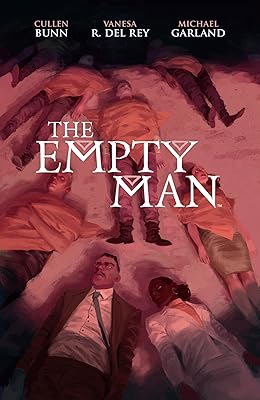
A deadly disease is spreading through unknown means. Cults have formed around an entity called The Empty Man. A duo of FBI and CDC agents is tasked with figuring it all out. The artwork is unsettling noir, with Twin Peaks and X-Files vibes.
I enjoyed this, but I was left wanting more. The story was too short and did not reach a conclusion. I recently learned there are follow-up books, which I will definitely check out.
Spoilers: The Empty Man is a being whose physical form is basically dead-preserved through life support. The mind is a powerful psychic entity, possibly capable of operating without a physical form. The empty man is able to reach out and invite others to join its psychic domain, which manifests in the real world as the supernatural thought virus, Warhammer 40k Emperor of Mankind style.
Inside Her: A Sapphic Love Story by Lisa J Evans

Inside Her is an LGBQT romance novel, although it's mostly a tragedy. The main character, finding love for the first time in a friend-of-a-friend, experiences a coming-out story that questions her friendships and loyalties.
Some dark topics are broached throughout the book (a content warning list would be longer than my arm) and a large amount of smut, too. My main issue with the story is that although the character has been through (and continues to go through) a lot, she's inherently unlikable. Redemption comes very late in the story, in a hastily "and then this happened" manner, so it didn't feel deserved.
The Left Hand of Darkness by Ursula Le Guin
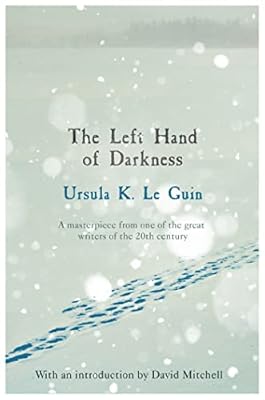
A science fiction masterwork from the Sixties. The Earthling Genly Ai is sent to the planet Gethen as an envoy to persuade its leaders to join a galactic federation of planets. Gethenians take an androgynous form for most of a lunar cycle before adopting a male or female form for a brief period known as kemmer. Le Guin uses this society to challenge the role that sex and sexuality place on culture and interactions. Genly fails to understand the nuances of this initially, leading to exile and imprisonment. Although the structure of the story is difficult to grasp, mixing first-person reports with historical observations, Genly, with his advocate Estraven, does come to a deeper understanding that transcends. This is a fascinating story.
Yellowface by Rebecca F Kuang
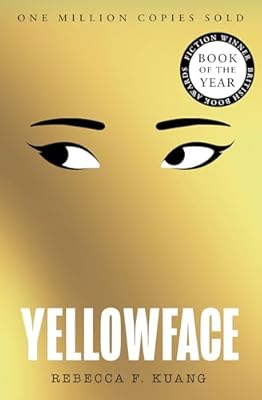
This is another masterpiece by Rebecca Kuang. I loved Babel when I read it last year, and this is on the same level. I raced through this book out of pure enjoyment. The main character (June Hayward) is a struggling novelist living in the shadow of her internationally acclaimed 'best friend', Athena Liu, who dies suddenly in her apartment. June seized this opportunity to steal Liu's secret work-in-progress novel about Chinese labourers during World War One.
June readies the novel for publication, which launched with great success. She is welcomed into the upper echelons of the publishing world and lavishes the entertainment, celebrity and appreciation. But all's not right. Readers piece together suspicions.
June is initially written as an underdog, and the story is told from her perspective. This makes for a compelling and unsettling journey as she spirals downwards, believing her own lies.
Yellowface serves as an allegory to the erasure of Asian experiences and an exploration of the real effects of the perennially online keyboard warriors, cultural appropriation, authenticity and the cut-throat publishing industry. Brilliant.
All the Fiends of Hell by Adam L G Nevill

Imagine waking from a bout of flu to find that almost everyone else has been raptured away. Everyone heard some loud bells, stepped out of their doorways in the middle of the night, and vanished. All that's left are those who could not leave their houses. The invasion has happened and passed the main character by. There's nothing but survival, the ghosts of those who've gone, and an oncoming red storm that brings otherworldly mist monsters.
All the Fiends of Hell is an inventive invasion storyline reminiscent of zombie-style survival horror and War of the Worlds. I liked that the main character was nothing special - no particular skills, talents, or hidden competencies - just someone who missed the bus. But along the way, he takes under his wing two children, makes some terrible mistakes, and does his best to keep them safe. Brilliant stuff.
Politics in Software Development by Peter Wendorff
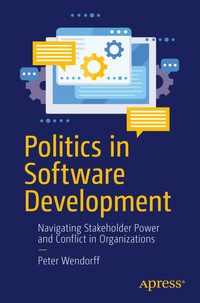
This is a relatively short but useful study of the political factors that drive software development. Wendorff aims to balance academic and accessible writing (not that the two are always mutually exclusive).
Using some seminal works, including The Agile Manifesto, Edward Yourdon's Death March, and Jeffrey Pfeffer, Wendorff contrasts a unitary and pluralist approach to organizational politics. Much of the literature on technology takes the unitary view that organizations are places where we come together to collaborate on shared goals openly and honestly. Wendorff acknowledges that the pluralist perspective is the more pragmatic approach, namely that there will be differences in goals and objectives, leading to conflict, politics, and opportunities for influence.
Politics is something often frowned upon within organizations. It should not be considered a wholly negative activity but rather an essential expression of power dynamics, conflict resolution and agenda-setting. Indeed, the processes that organizations utilize to get things done are an expression of political choice. The Agile Manifesto itself is a political document - it's in the name. Advocating for self-organizing teams, individuals and interactions over processes and tools expresses where power should lie and how staff should exercise it.
To influence what happens in their organizations, developers should take stock of the factors that drive decision-making and agenda-setting.
Nuclear War - A Scenario by Annie Jacobsen
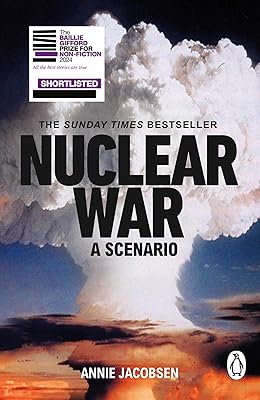
I listened to this in audiobook form at 1.7x speed.
Nuclear War is an apocalyptic event. Culturally, we are keenly aware of mushroom clouds, the finality of fallout, the danger of mutually assured destruction, and the paradox of deterrence.
Jacobsen explores this topic minute by minute through a hypothetical scenario: A dictator in North Korea unilaterally unleashes an Intercontinental Ballistic Missile (a long-range missile with a nuclear payload) on the Eastern seaboard of the United States. What follows is a detailed report on the processes and procedures that are triggered. First, within milliseconds, the warhead is detected. Detailed analysis validates the oncoming threat. On the political side, diplomatic queries fail. In the United States, the President has the sole authority to launch nuclear weapons by selecting a strategy from highly detailed, pre-prepared scenarios.
Interspersed with the fictional telling, Jacobsen provides history lessons on specific topics, such as the theory of deterrence, radiation sickness, and wargaming.
The final blow is in the harrowing telling of the impact of a nuclear weapon. The sheer scale of damage is near-incomprehensible. At the epicentre, immediate annihilation. In outer circles, all-consuming hellfire. Further away, the poisonous rain of fallout. I am reminded of Robert Oppenheimer's citation of the Bhagavad Gita: "Now I am become Death, the destroyer of worlds."